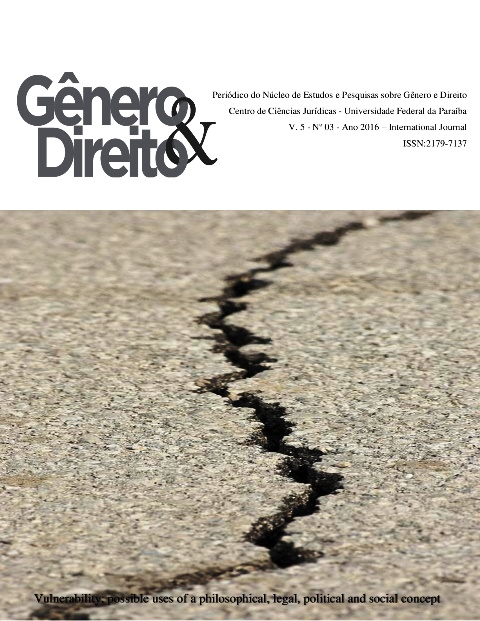MAKING THEM STRONG? VULNERABILITY, CAPABILITIES AND RESILIENCE IN POOR CHILDREN
Palavras-chave:
vulnerability, resilience, capability approachResumo
The main purpose of our paper consists in establishing the idea that the negative consequences that result from child poverty can be mitigated if the government and social workers promote the resilience of poor children. We use Amartya Sen’s capability approach as an evaluative framework to argue for this thesis. By distinguishing different sources of vulnerability we assume that children are inherently vulnerable, because they are dependent and in need of care. Poor children are, however, even more vulnerable in specific ways. Following Catriona MacKenzie, we call these vulnerabilities “pathogenetic”; they are caused by social arrangements like institutional settings. We claim that at least some some of those vulnerabilities can and should be diminished by promoting children’s resilience. We proceed in three steps. In the first part of the paper, we develop our concept of vulnerability and explain how child poverty renders children vulnerable to specific harms. Here we also introduce the capability approach by asking which capabilities children need for coping with this situation. In part two we argue that the concept of resilience helps us to understand why capabilities (and not resources or abilities) are relevant for coping with the adverse effects of child poverty. We claim that promoting the capabilities of children is a matter of justice, and that implementing resilience is, too. It is also highly important to see that promoting resilience is mainly a social matter, not a task the individual child has to fulfil on its own. Hence, we argue that children are entitled to gain those capabilities that promote their resilience against the adverse effects of poverty. In part three we discuss several difficulties of our account, such as the danger that children will be burdened with coping with the effects of poverty instead of society fighting poverty.Downloads
Referências
Archard, David (2004), Children: Rights and Childhood, London: Routledge.
Ballet, Jerome; Biggeri, Mario and Comim, Flavio (2011), Children and the Capability Approach, New York: Palgrave Macmillan.
Biggeri, Mario and Mehrotra, Santosh (2011), “Child Poverty as Capability Deprivation: How to Choose Domains of Child Well-Being and Poverty”, in Ballet, Biggeri and Comim (eds.), Children and the Capability Approach, New York: Palgrave Macmillan: 46-75.
Buss, Sarah (1994), “Autonomy Reconsidered”, Midwest Studies in Philosophy, 9: 95-121.
Cohen, Gerald Allan (1989), “On the Currency of Egalitarian Justice”, Ethics, 99: 906-944.
Dodds, Susan (2013), “Dependence, Care, and Vulnerability”, in Mackenzie (ed.), Vulnerability. New Essays in Ethics and Feminist Philosophy, Oxford: Oxford University Press: 181-204.
European Commission (2007), Joint Report on Social Protection and Social Inclusion, EU publications office, retrieved 31.01.2016, http://ec.europa.eu/social/BlobServlet?docId=2014&langId=en
Exenberger, Silvia and Juen, Barbara (2013), Well-Being, Resilience and Quality of Life from Children’s Perspectives: A Contextualized Approach, Dordrecht: Springer.
Fineman. Martha A. (2008), “The Vulnerable Subject: Anchoring Equality in the Human Condition”, Yale Journal of Law and Feminism, 20 (1): 8-40.
Goodin, Robert E. (1985), Protecting the Vulnerable, Chicago: University of Chicago Press.
Hart, Betty and Risley, Todd R. (1995), Meaningful Differences in the Everyday Experience of Young American Children, Baltimore: Paul H Brookes Pub Co.
Luthar, Suniya S. (ed.) (2003), Resilience and Vulnerability: Adaptation in the Context of Childhood Adversities, Cambridge: Cambridge University Press.
Macintyre, Alasdair (2001), Dependent Rational Animals: Why Human Beings Need the Virtues, Chicago: Open Court.
Mackenzie, Catriona (2013), “The Importance of Relational Autonomy and Capabilities for an Ethics of Vulnerability”, in Mackenzie (ed.) Vulnerability. New Essays in Ethics and Feminist Philosophy, Oxford: Oxford University Press: 33-60.
Nussbaum, Martha C. (2006), Frontiers of Justice Disability, Nationality, Species Membership, Cambridge, Mass.: Harvard University Press.
Nussbaum, Martha C. (2001), Women and Human Development: The Capabilities Approach. The John Robert Seeley lectures, Cambridge: Cambridge University Press.
Osterndorff, Guido (2013), “Selbstwirksamkeitsmessung in der Kinder- und Jugendhilfe. Der Capability Approach und seine Anwendung: Fähigkeiten von Kindern und Jugendlichen erkennen und fördern”, in Graf, Kapferer, Sedmak Clemens (eds.), Der Capability Approach und seine Anwendung, Wiesbaden: VS Verlag: 227–243.
Robeyns, Ingrid (2005) “The Capability Approach: A Theoretical Survey”, Journal of Human Development, 6 (1): 93-114.
Robeyns, Ingrid (2009), “Capabilities and theories of justice”, in Chiappero-Martinetti (ed.), Debating Global Society: Reach and Limits of the Capability Approach, Milano: Feltrinelli: 61–68.
Schweiger, Gottfried and Graf, Gunter (2015), A Philosophical Examination of Social Justice and Child Poverty, New York: Palgrave Macmillan.
Sen, Amartya (1999), Development as Freedom, Oxford: Oxford University Press.
Sen, Amartya (2010), The Idea of Justice, London: Penguin Books Limited.
Singh, Gopal K. et al. (2011), “Dramatic Increases in Obesity and Overweight Prevalence and Body Mass Index Among Ethnic-Immigrant and Social Class Groups in the United States, 1976–2008”, Journal of Community Health, 36 (1): 94-110.
Stoecklin, Daniel and Bonvin, Jean-Michel (eds.) (2014), Children’s Rights and the Capability Approach: Challenges and Prospects, Dordrecht: Springer.
Walker, Brian and Salt, David (2012), Resilience Thinking: Sustaining Ecosystems and People in a Changing World, Washington D.C.: Island Press.
Werner, Emmy (1993), “Risk, Resilience, and Recovery: Perspectives from the Kauai Longitudinal Study”, Development and Psychopathology, 5 (4): 503-515.
Yates, Tuppett M., Egeland, Byron, Sroufe, Alan (2003), “Rethinking Resilience – a Developmental Process Perspective”, in Luthar (ed.) (2003), Resilience and Vulnerability: Adaptation in the Context of Childhood Adversities, Cambridge: Cambridge University Press: 243-266.
Ungar, Michael (2008), “Resilience across Cultures”, British Journal of Social Work, 38: 218–235.
Zander, Margarete (2008), Armes Kind – starkes Kind? Die Chance der Resilienz, Wiesbaden: Springer VS Verlag für Sozialwissenschaften.

